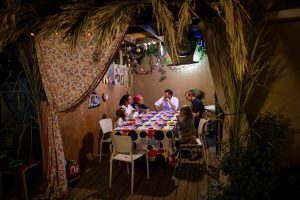
The holiday of Sukkot (Feast of Tabernacles) is an important and joyful tradition which represents a spiritual ascent. The true meaning of this festival is to build a new reality of mutual understanding and support—a sukkah (hut) of peace—through the positive force we generate through our cohesion.
Today—when disunity is the common denominator among families, within societies, between countries—the principle of this celebration is particularly relevant.
This festivity is also called the “Feast of Harvest,” because it celebrates the annual gathering of the harvest. As it is written, “On the fifteenth day of the seventh month, when you gather in the produce of the land, you shall celebrate the festival of the Lord for a seven day period.” (Leviticus 23:39)
From a spiritual perspective, Sukkot symbolizes a beautiful process of inner change. It is customary to celebrate this holiday in a temporary structure built specifically for this period, the sukkah. Its roof, called schach, must be made of the “waste of barn and winery.”
This waste represents the things we toss aside and rate as less essential. We raise values such as giving, caring, empathy, solidarity, mutual responsibility above our heads as the most precious and important attributes there are, like a sheltering roof to shade us from the burning sun. As it is mentioned in the Song of Songs: “I sat down under his shadow with great delight…”
Making the roof specifically from those usually discarded elements into the covering of the festive hut means we have the intention to invert our values and transform ourselves from self-centered individuals into caring and empathetic human beings. It seems that today these ideals are precisely what we need in order to mitigate the raging anger that has spread throughout our daily lives.
Sukkot is a call to exit our comfortable egoistic “home,” meaning our self-love, and to build a new structure, a sukkah, as a symbol of the new world that we can create if we acquire the qualities of bestowal and brotherhood, the qualities most important for creating a solid and sustainable society from which everyone will benefit.
What stands in the way of us creating a good life for all, including ourselves? It is none other than the human ego—the desire to enjoy at the expense of others. As part of humanity’s natural evolution, the ego has grown to dreadful proportions, while nature expects us to keep its basic law of balance between all its elements: still, vegetative, animate, and human.
The harsh conditions humanity is enduring with a global pandemic, climate imbalances, and worldwide disruptions, are nature’s attempts to reverse our state of separation and bring our hearts closer to one another. Such states call for the building of a true sukkah of love and unity that will cover all of humanity for a good future. The sooner we comprehend the lesson nature is teaching us, the sooner we can transform our fleeting and fragile life into one that is positive, stable, and peaceful.
We, as Jewish people, must be an example of cohesion and lead the way for others to follow, gathering the whole world beneath one big thatch-covering where we will be united as one. When this comes to pass, the temporary dwelling of the sukkah will be completed as the common space we make for each other within our hearts, ensuring humanity a healthy life and happy coexistence under one global roof.